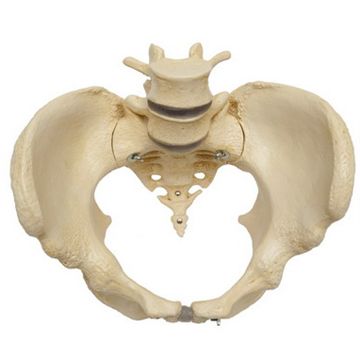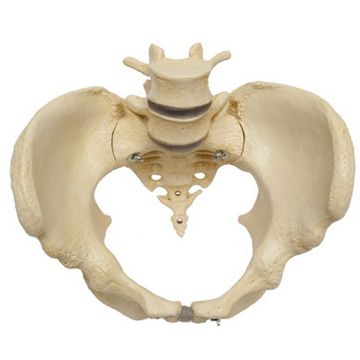SKU:EA1-A219
Pelvic model showing bones and joints in the woman's pelvis
Pelvic model showing bones and joints in the woman's pelvis
3 in stock
Couldn't load pickup availability
This pelvis model shows the woman's pelvis and the 2 lower lumbar vertebrae.
The model is cast in the natural size of the pelvis, and the level of detail on the bones is good. The joints are assembled using metal pins and nuts. The front joint (the symphysis) is also glued and consists of soft silicone. Via the joints, the pelvis can be separated if desired. Below you can read more about the pelvic measurements in relation to the pelvis as a way of birth.
We sell fetal dolls, which are targeted for birth preparation. Our fetal doll with placenta (mother cake) and umbilical cord fits exactly to this pelvis model, so that the pelvis as a birth canal can be demonstrated with the doll.
Anatomical features
Anatomical features
Anatomically, the model shows the female pelvis. Just like in men, the pelvis consists of the 3 building blocks, which are the 2 hip bones and the sacrum. The model also shows the 2 lower lumbar vertebrae. Overall, the model shows the following bones:
Os coxae (the 2 hip bones) of which both are composed
- Os ilium (iliac bone/hip bone)
- Os ischii (seat bone)
- Os pubis (pubic bone)
Us sacrum (sacrum) incl. os coccygis (coccyx)
4th and 5th lumbar vertebra (lumbar vertebra)
In the bone tissue, the most important details can be seen, such as large nodules. Smaller details such as the linea glutaea are omitted.
The pelvis as a birth canal
Normally the following 3 connection lines are specified:
- Conjugata vera (normally measures 11 cm in the female pelvis)
- Diameter obliqua (usually measures 12.5 cm in the woman's pelvis)
- Diameter transversa (usually measures 13 cm in the woman's pelvis)
On this pelvis model, the above measurements are respectively: 10.5 cm, 13 cm and 14.5 cm.
You can also use a measure for the anteroposterior exit from the pelvis, which is the distance from the symphysis to the tip of the coccyx. On this model, the distance is approximately 11 cm (but it depends on the position of the coccyx, as it is movable).
Product flexibility
Product flexibility
In terms of movement, the model's joints must be mentioned. Both the SI joints (articulatio sacroiliaca) and the symphysis (symphysis pubica) are held together via screws and nuts. They can be easily loosened so that the joints can also be "unfastened" and moved. The symphysis is also glued. With a firm pull it can still be loosened (when the nut on the screw is also loosened).
The joint between the sacrum and the coccyx (articulatio sacrococcygea) is extremely flexible, because the coccyx is held firmly on the sacrum by means of an elastic band (which is not particularly visible). Furthermore, the tail bone consists of 2 parts, which are also movable relative to each other, because they are also held together using the elastic.
Joints in the 2 lower lumbar vertebrae (facet joints and intervertebral discs) are not movable at all.
The variant with femur stumps, includes the upper part of the femur bones, mounted on elastics, which allow free movement. The femur stumps cannot be removed.
Clinical features
Clinical features
Clinically speaking, the model can be used in connection with birth preparation and the like. The pelvic model can also be used to understand pelvic fractures with misalignment as well as specific diseases such as axial spondyloarthritis, which i.a. involving the SI joint.
Share a link to this product


A safe deal
For 19 years I have been at the head of eAnatomi and sold anatomical models and posters to 'almost' everyone who has anything to do with anatomy in Denmark and abroad. When you shop at eAnatomi, you shop with me and I personally guarantee a safe deal.
Christian Birksø
Owner and founder of eAnatomi ApS

